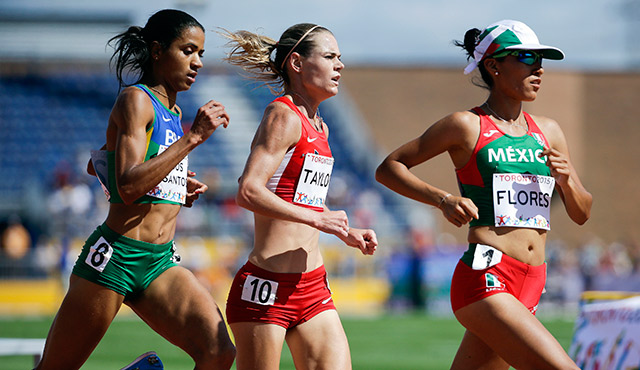TORONTO (CNS) — Growing up in Venezuela, Jesuit Father Eduardo Soto fell in love with the Pan Am Games when his home country hosted the quadrennial event in Caracas in 1983.
“I was only 11 years old and I remember all of the excitement surrounding the call for us to be there as the country that hosted the Pan Am Games,” Father Soto said. “And I still follow the Pan Am Games. Team sports are my favorite but also track and field and swimming are great as well.”
A step for athletes looking to qualify for the 2016 Summer Olympics, this year’s Pan Am Games, hosted by Toronto, will draw more than 5,000 athletes from across the Americas.
What captivated Father Soto as a youngster about the games was the way in which the athletes from the different sports came together as one team to represent their nation.
Now, 32 years later, Father Soto will be spending most of his summer not only soaking in the spirit of sport, but also working the games as a member of the Catholic chaplaincy team.
“I feel like this is an opportunity to be part of the team,” he said. “To be part of the chaplaincy team at the Pan Am Games will be an opportunity, like a lab, to bestow and develop all of my skills, all of my intercultural training, all of my tools as a priest and as a counselor with very special people.”
Father Soto, currently in ministry in Winnipeg, Manitoba, will be one of three full-time chaplains at the games. The team will be available from 7 a.m. to 11 p.m., July 1 to Aug. 18, and will work in two shifts. The chaplains will be supported by six part-time members. The games take place in two stages: the Pan Am Games July 10-26 and the Parapan Am Games Aug. 7-18.
The team will work primarily in the athletes’ village located in the east end of downtown Toronto. The Catholic chaplains will celebrate daily Mass, provide spiritual counseling and simply lend an ear to participants.
“What the volunteers, the coaches and the athletes will need I think will primarily be Mass and confessions,” said Deacon Stephen Pitre, coordinator of the permanent diaconate for the Archdiocese of Toronto and head of the Catholic Pan Am chaplain team.
“That will be of course very important to (athletes) leading up to their events. The rest of it as far as their needs that we can handle would primarily revolve around just talking and listening because these athletes, especially when you think of Central and South America, this is a big opportunity for them.”
Not only will the chaplains’ presence be important leading to their competitions, Deacon Pitre said he expects many athletes will turn to the chaplains from all faiths following their events as well.
“Someone is going to lose,” he said. “So we are going to be dealing with that on an ongoing basis.”
Father Soto, who spent several years working in Venezuela and other South American countries, knows exactly how he will console the inevitable losers.
“The reality is you have 20 athletes or 30, and only three of them are going to have medals,” he said. “The rest won’t. They will be disappointed and frustrated, but the point is to help them to see this is a process for them as an athlete.”
Having spent most of his life following the Pan Am Games, and as an amateur athlete himself, Father Soto said there is one other task he expects to be called upon during the event — one of the duties he looks forward to most.
“Athletes in South America and Central America, they like their equipment and all their things to be blessed before going to competition,” he said.
“For them, it is a sign that God is with them. I feel like in that I can give back to the athletes.”

